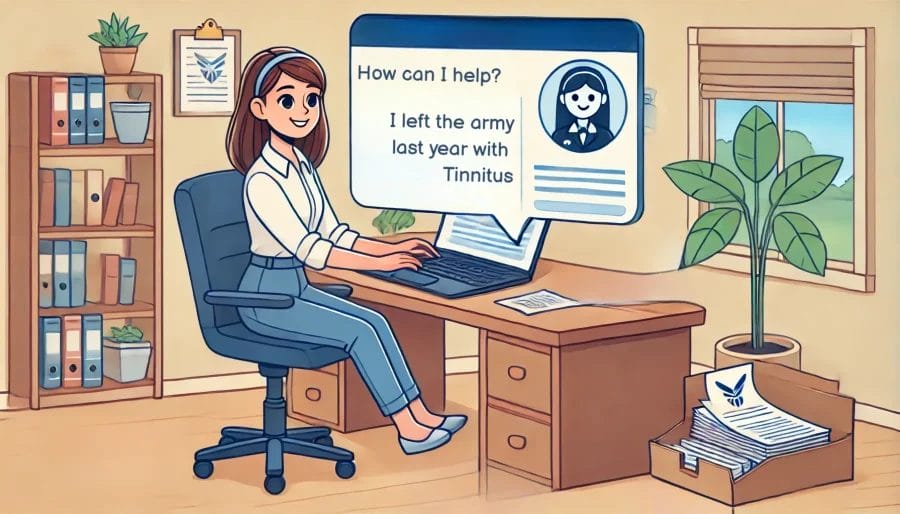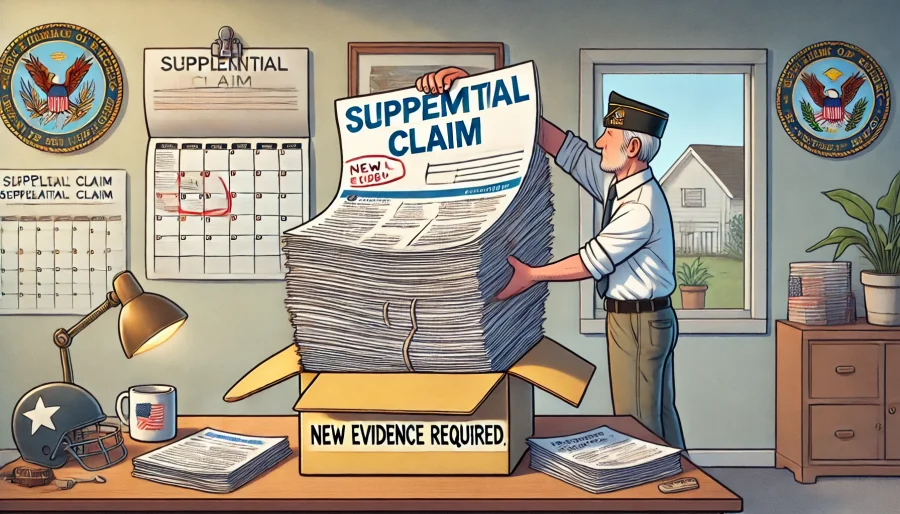Navigating the VA claims appeals process can be overwhelming, especially if your initial claim for disability compensation has been denied or received a lower rating than expected.
Veterans have the right to appeal the VA’s decision through a streamlined process offering three different appeals options: Higher-Level Review, Supplemental Claim, and Board Appeal. This guide will walk you through these options and how each one can impact your case.
Why Might You Need to Appeal a VA Disability Decision?
After submitting your initial VA disability claim, the VA assigns a rating based on the severity of your condition and its connection to your military service. Sometimes, the VA may deny your claim, or you may feel that the rating percentage doesn’t accurately reflect your condition’s severity. In these cases, veterans can appeal the decision through one of the three available pathways.
The Three VA Appeals Process Options
In 2019, the Veterans Appeals Improvement and Modernization Act (AMA) introduced a simplified system to help veterans manage their appeals efficiently. The three appeals process options are:
- Higher-Level Review
- Supplemental Claim
- Board Appeal
AI Powered Chatbot for VA Disability Claims
Learn more about the VA Disability process and get help with our VA Disability Claim Chatbot programmed and trained by AI

1. Higher-Level Review
The Higher-Level Review allows a veteran to request that a more experienced VA employee review the original decision without submitting new evidence. This option is ideal when you believe the VA made an error or overlooked something in your initial claim.
Key Points of Higher-Level Review
- No New Evidence Allowed: The senior reviewer will base their decision solely on the evidence previously submitted with the original claim.
- Senior Reviewer: A more experienced VA employee will review the case for errors.
- Optional Informal Conference: You can request a phone call to explain why you believe an error was made in the original review.
- Timeline: Decisions are typically made within 125 days.
When to Choose Higher-Level Review:
This option is best when you believe the VA made a clear mistake in your initial decision and you do not have any new evidence to submit.
2. Supplemental Claim
If you have new and relevant evidence that wasn’t considered in your original claim, you can file a Supplemental Claim. This option gives you the opportunity to introduce new medical records, diagnostic reports, or other supporting documents that could affect the VA’s decision.
Key Points of Supplemental Claim
- New Evidence Required: You must provide new and relevant evidence that was not part of your initial claim.
- VA Duty to Assist: The VA is obligated to help gather additional evidence, such as medical records, to support your claim.
- Review Process: The VA will review the new evidence along with the previous file to make a new decision.
- Timeline: Supplemental claims are generally resolved within 125 days.
When to Choose Supplemental Claim:
This is the best option if you have obtained new evidence (such as medical records or nexus letters) that could lead to a different outcome for your claim.

3. Board Appeal
A Board Appeal is the most formal and comprehensive option, where your case is reviewed by a Veterans Law Judge at the Board of Veterans’ Appeals (BVA). You have three choices in this process, depending on whether you want to submit new evidence or request a hearing.
Types of Board Appeals
- Direct Review: The Board reviews your case without considering new evidence or holding a hearing. This is the fastest of the three Board Appeal options.
- Evidence Submission: You have 90 days to submit new evidence, which the judge will consider along with the original file.
- Hearing with a Veterans Law Judge: You can request a hearing with a judge in person, by video conference, or over the phone. This is the most time-consuming option, but it allows you to present your case directly to the judge.
Key Points of Board Appeals
- Complex Review: Your case is reviewed by a Veterans Law Judge, who will issue a final decision.
- Multiple Options: You can choose from Direct Review, Evidence Submission, or a Hearing.
- Longer Timeline: Timelines vary based on the type of review, with Direct Review being the quickest (about 12 months), while hearings typically take more than a year.
When to Choose a Board Appeal:
If you want your case reviewed by a judge or if your claim requires more comprehensive review, including the submission of new evidence, this is the right option.
Choosing the Right VA Claims Appeals Process
Deciding which appeals process to pursue depends on your specific circumstances:
- If you believe the VA made a mistake and you don’t have new evidence, the Higher-Level Review is likely the best option.
- If you’ve obtained new medical records or other relevant documents, a Supplemental Claim is the right path.
- If you want your case reviewed by a Veterans Law Judge or wish to present new evidence and a hearing, then a Board Appeal is the way to go.
What Happens After the VA Appeals Process?
Once your appeal has been reviewed, the VA will issue a decision. Possible outcomes include:
- Fully Favorable Decision: The VA agrees with your appeal and grants the benefits requested.
- Partially Favorable Decision: The VA agrees with part of your appeal but not the entire claim.
- Denied: If the VA denies your appeal, you can escalate to a higher-level review or file another type of appeal.
Tips for Strengthening Your VA Appeals Claim
1. Gather Comprehensive Medical Evidence
Make sure your medical records clearly document the service connection between your condition and your military service. This is critical for both initial claims and appeals.
2. Obtain a Nexus Letter
A nexus letter from a qualified healthcare provider can strengthen your case by linking your current condition to your time in the military. This is especially helpful in a Supplemental Claim or Board Appeal.
3. Work with a VA-Accredited Representative
Navigating the VA claims appeals process can be challenging. Consider working with a VA-accredited attorney or representative to ensure your appeal is handled effectively.
